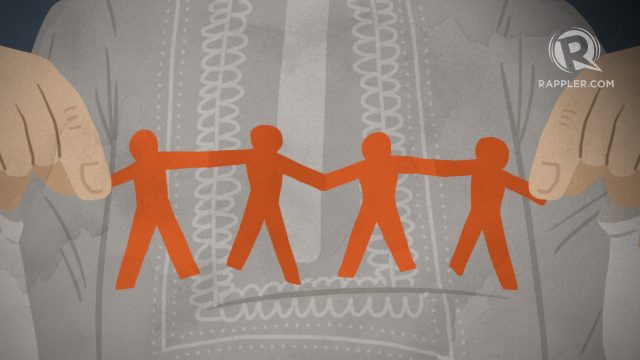SUMMARY
This is AI generated summarization, which may have errors. For context, always refer to the full article.
 Kapwa is a word meant to bring Filipinos together, but it seems to have lost meaning in recent times.
Kapwa is a word meant to bring Filipinos together, but it seems to have lost meaning in recent times.
Kapwa, as defined by the father of modern Filipino psychology, Virgilio Enriquez, means “shared identity,” “equality,” and “being with others.”
To put it simply, kapwa is the obligation we have towards our fellow man. Knowing this, simply hearing the word may bring to mind the likes of Ghandi, Mother Teresa, Malala Yousafzai.
But if kapwa is so central to the Filipino experience, then why do we see so little of it in our everyday lives? Who do we consider kapwa? How do we embody it?
The history of kapwa
The kapwa ideology has existed in our country long before the time of our colonizers.
The basic structure of our ancestral social groups made kapwa not just a virtue, but a law, a set of unspoken rules which dictated the hierarchy of a barangay (village), maintained social order, and ensured all families’ needs were met and provided for.
When the Spanish, and then the Americans, landed in our country, kapwa was a way for Filipinos to stand in solidarity against Western influence.
If kapwa means “us,” then our colonizers were the proverbial “them.” In a very real and significant way, kapwa was the driving force behind the Filipino spirit of revolution – one which led, eventually, to our triumphant independence.

But there is one aspect of kapwa that is crucial to Filipino culture, even today. It is called utang na loob, or the debt of gratitude we owe to others, particularly those who are superior to us. Today, this means a child is, from birth, indebted to their parents.
In history class, it means that although we spent centuries fighting for our independence, in many ways, we are still taught to be thankful towards the Spanish and the Americans. We gave them our land, but they gave us religion.
We gave them our men and women, but they gave us our freedom, and our ability to speak English.
One must wonder: In those days, were Filipino slaves taught to have utang na loob to the Spanish landowners who gave them food and money but had also stolen their land and livelihood?
If questions like this could be relegated to the past, then perhaps we Filipinos could be allowed to keep our kapwa, this ancient ideology which is central to our cultural identity.
But the reality is that while times have changed, Filipinos have grown idle. Kapwa, in its current definition, can no longer exist in our country.
Kapwa today
A friend of mine was recently having lunch at a food stall in the University of the Philippines when she overheard two waiters talking about a corrupt Filipino politician and known criminal.
“Gusto ko siya kasi yung pabahay namin galing sa kanya. Ang dami kaya sa amin na yun pabahay galing sa kanya (I like him because our housing came from him. Many of the people in my neighborhood got their housing from him).”
Instead of agreeing, the man’s friend scoffed. “Eh di ba magnanakaw yun (Isn’t he a thief?)”
“Okay lang,” the man replied. “At least napupunta sa mahihirap.” (It’s okay. At least it goes to the poor.)
Of course, while the first waiter might see the amount of money which this particular politician has invested into his barangay, all his friend – and mine – could think of was how much more money this particular politician had managed to pocket over the years.
But who could blame the waiter, or his barangay?
To them, kapwa was the reason that a man they did not know had found it in his heart to build their homes. Kapwa is what kept a roof over their heads, kept them fed, made them feel like they were part of a community that was looking out for them – a community in which they could prosper.
What these people could not see is that kapwa, in this case, can also be used as a distraction.
Just as a Spanish landowner can demand the loyalty of those people whose land they’ve stolen, so too can a corrupt politician draw admiration from the very people whose money he steals.
Leave a man with nothing, and he will be thankful for a morsel. Because wrapped in the pretense of generosity is a deception that has become too common in Philippine politics.
It is the idea drilled into the heads of the masses that success can only be attained through sacrifice, even as our politicians snatch that opportunity away with their corruption.
Does this mean that sacrifice for the sake of the greater good, also a crucial aspect of kapwa, is demanded only from the poor, and not the powerful?
Because as our population has grown, it seems more and more impoverished Filipinos have been asked to give up basic healthcare, quality education, and free contraception. They are asked, as much by our Catholic clergy as our politicians, to be patient and think of their suffering as a holy act.
In fact, ask a Filipino clergyman like Bishop Gilbert Garcera of Camarines Norte, and he will say that poverty, as a result of overpopulation, is “not a problem.” (READ: The irresponsibility of rabbits)
He says that our people could make “good wives for foreigners,” good caretakers for other “aging nations” beyond our own. Church executive Father Castro goes so far as to say that overpopulation is “good for the economy. Ibig sabihin niyan meron tayong (it means we have) workers.” (READ: Spiritually pro-RH)
Sacrifice as purpose. Corruption over prosperity. Kapwa may imply a shared identity, but where progress is concerned, it is clear that the distribution has not been shared. It has not been even.
Embodying kapwa
This is not to say that kapwa has become the tool solely of evil men. In fact, it is quite the opposite – in times of fear or calamity, kapwa is what has delivered the Philippines, as a country, out of the darkness time and time again.
It is the power of family, the power of friendship; it is the identity which is created by a group of people who share a common culture and common memories.
In the right hands, kapwa can be a tool for social change. Already, projects like MUNI have been organizing meetups and pop-up markets to promote a more sustainable Philippines.
Others have used the kapwa ideology to give a voice to marginalized people, like our LGBT+ comrades.
A few months ago, a local website created a blog post with the title, “Concerned Citizen Teaches Us How to Improve the Country in Two Minutes.” It depicts two images: the first showing an ATM surrounded by trash, followed by another image taken two minutes later, in which the surrounding floor is swept clean.
“Expect better from ourselves,” says the post. “Expect better from our countrymen. Take ACTION!”
Did this man simply possess a stronger sense of kapwa than most of his countrymen? Did kapwa run through his veins like an unseen superpower – one which the rest of us Filipinos had lost?
I believe that the answer lies in seeing kapwa as an act, rather than a personal trait inherent in all Filipinos. When we treat everyone equally: that is kapwa. When we do things for the sake of others: that is kapwa.
It is not something we possess, nor can it be something we rely on others to embody. Taking action is the definition of kapwa that our country needs today. – Rappler.com
Frankie Concepcion is a writer from the Philippines living in the US. Visit her site here.
This post was originally published on X.
Add a comment
How does this make you feel?
There are no comments yet. Add your comment to start the conversation.